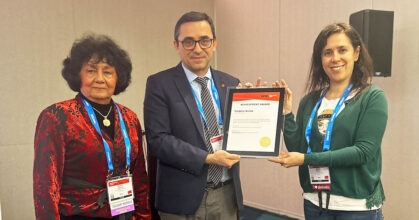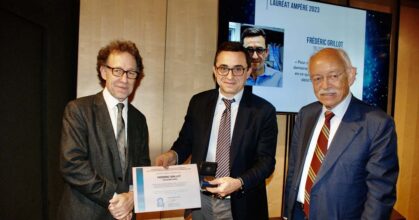Télécom Paris is a member of Carnot Télécom & Société Numérique, the first Carnot Institute devoted to information and communication sciences and technology, which is part of a network of 29 Carnot Institutes. The TSN Carnot Institute comprises 20 accredited joint laboratories, including the LTCI at Télécom Paris, for a total of more than 2,000 researchers and PhD students. It provides cutting-edge research and integrated solutions to issues related to ICT (information and communications technology).
Such initiatives include:
- teaching and research chairs
- joint laboratories
- innovation institutes
Joint Laboratories
Data Science and Artificial Intelligence
Valeo.IA: artificial intelligence for autonomous vehicles
Valeo.IA is the first research center opened on artificial intelligence and deep learning for automobiles. Partners: the CEA, Inria, Mines ParisTech and Valeo.
Digital Trust
BART: Blockchain Advanced Research & Technologies
Inria, a research institute dedicated to digital technology, Télécom Paris and Télécom SudParis, prestigious IMT engineering schools and research centers for innovation in the digital world, and SystemX, an Institute of Research and Technology (IRT) devoted to digital engineering for the future, have teamed up to combine their expertise in blockchain technology through a framework agreement formalizing the creation of the BART joint research project.
ISA : Identity & Security Alliance
Idemia is the world’s leading biometric security company. It has worked on collaborative research projects with the school for several years and the two organizations decided to anchor this collaboration by setting up a joint laboratory, which was launched in March 2011. The laboratory works on topics in different fields related to security and identity, such as IT security and cryptography, components security, identity management systems etc.
Design, Interaction, Perception
Seido: security for the Internet of Things
EDF R&D and Telecom Paris have set up a joint research laboratory devoted to the Internet of Things and cybersecurity for electrical systems. Its objective is to prepare for and facilitate the deployment of energy demand management services based on the interoperability of equipment (heaters, air conditioners, white and brown goods, electric vehicles etc.) to help ensure the coherence, efficiency, and safety (security, privacy etc.) of the entire system.
This laboratory brings together specialists from a wide range of disciplinary fields (security, networks, the internet, the energy industry, electrical networks etc.) around common industrial aims.
Very Large Networks and Systems
TTool: 5G, the next major phase in the evolution of mobile communication standards
The fifth generation of mobile networks (5G) defines the next major phase in the evolution of mobile telecommunication standards. It should provide faster data speeds and meet new user requirements, such as Internet of Things and cloud computing. In order to support a large number of different communication protocols in a flexible way, electronic systems (platforms) for a fifth-generation network will be developed, in particular with reprogrammable architectures.
The main objective of this collaboration between Nokia Bell Labs and Télécom Paris is therefore to develop new programming techniques and algorithms based on high-level models that allow engineers to distance themselves from the complexity of these platforms and to quickly (re)program/reconfigure them. These techniques and algorithms will be integrated and made available in the computer-aided design tool TTool/Diplodocus (free license).
Whist Lab: Wave Human Interactions and Telecommunications, with Orange Labs
In light of their specific research objectives and the current scientific environment, IMT and Orange Labs have decided to reinforce their shared research capabilities in the field of electromagnetism applied to dosimetry and wave-human interactions to help research teams harmonize their research and innovation activities based on jointly-identified areas of research.
Digital Innovation
Model-Oriented Programming: a new, simplified programming paradigm for digital infrastructures
Electronic hardware architecture that supports future telecommunications regulations (such as 5G) will be highly diverse and complex. To simplify the programming of digital infrastructures, the researchers involved in this joint laboratory are trying to tackle two issues: rewriting code and the optimal use of electronic architecture.
Partner: Nokia Bell Labs France.
Lincs: Internet of the future
The LINCS laboratory – Laboratory for Information, Networking and Communication Sciences, a joint research laboratory for the Internet of the future, was created in October 2010 by Nokia, Inria, UPMC and Télécom Paris and officially launched in May 2011. SystemX has since joined the laboratory.
ICT4V: Information and Communication Technologies for Verticals
ICT4V is a multidisciplinary center for research and innovation in the field of information and communication technologies, based in Montevideo, Uruguay. It studies how ICT interacts with different vertical sectors such as healthcare, agriculture, environment, energy, and banking. Designed as an open partnership, ICT4V currently brings together five universities and research institutions, nine companies, the Uruguayan national agency for e-governance and the LATU technology park. IMT and Télécom Paris have played a significant role in the creation and development of ICT4V.
Innovation Institutes and Laboratories of Excellence (Labex)
Digicosme
DigiCosme is a Laboratory of Excellence (LabEx) in Digital Sciences, which has received €9 million in funding through the Ministry of Higher Education and Research’s Investissements d’Avenir (Future Investments) program and supported by the Paris-Saclay Foundation for Scientific Cooperation.
The project focuses on three main topics which will play a central role in the development of tomorrow’s information and communication systems: reliability and security, network management and big data science.
The laboratory’s activities support training, research, and innovation in these areas. Its current scientific director is Florence d’Alché-Buc, a professor at Télécom Paris.
DigiHall
DigiHall is a lively, interdisciplinary community dedicated exclusively to digital innovation and research to reinvent the industry and help all companies speed up their transformation.
Set in Paris-Saclay’s vibrant, innovative ecosystem, DigiHall brings together the highest concentration of academic and industrial researchers in Europe. At this one-of-a-kind site, over 1,500 researchers work together to tackle the most challenging topics of today: artificial intelligence, cyber-physical systems, cybersecurity and the industry of the future. DigiHall is a thriving hub of scientific excellence devoted to economic performance.
DataIA Institute: data science, intelligence and society
The DATAIA Institute is a French convergence institute specializing in data science, artificial intelligence and society, focusing on how big data and artificial intelligence technologies intersect with social sciences and humanities to develop artificial intelligence for the benefit of humanity.
News

Frédéric Grillot awarded in Quantum Sensing and Nano Electronics and Photonics
Faculty Members, Very Large Networks and Systems — 13/02/2024... for his extensive work in the field of photonics and in particular [...]
Promote your scientific results
Faculty Members — 24/01/2024Researchers will learn how to present their results to their peers, the general public and the media.
Stefano Zacchiroli IEEE Software Best Paper Award
Faculty Members — 20/12/2023Professor in computer science, he receives the IEEE Software best paper award (year 2022) for "Reproducible Builds: Increasing [...]
Michèle Wigger is awarded an ERC Consolidator Grant
Faculty Members — 18/12/2023Professor in Information Theory at Télécom Paris, she's awarded an European grant for her project on Fundamental limits of [...]
Frédéric Grillot Ampère Medal 2023
Faculty Members — 12/12/2023The SEE honours him for his pioneering work on mid-infrared optoelectronics and quantum dot lasers for silicon photonics.




